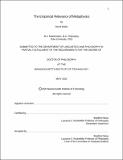| dc.contributor.advisor | Bradford Skow. | en_US |
| dc.contributor.author | Builes, David(David Alan) | en_US |
| dc.contributor.other | Massachusetts Institute of Technology. Department of Linguistics and Philosophy. | en_US |
| dc.date.accessioned | 2020-09-03T17:49:32Z | |
| dc.date.available | 2020-09-03T17:49:32Z | |
| dc.date.copyright | 2020 | en_US |
| dc.date.issued | 2020 | en_US |
| dc.identifier.uri | https://hdl.handle.net/1721.1/127150 | |
| dc.description | Thesis: Ph. D. in Linguistics, Massachusetts Institute of Technology, Department of Linguistics and Philosophy, May, 2020 | en_US |
| dc.description | Cataloged from the official PDF of thesis. | en_US |
| dc.description | Includes bibliographical references. | en_US |
| dc.description.abstract | Are metaphysical debates relevant to ordinary empirical inquiry? This dissertation collects a series of papers which answers in the affirmative. The first part of the dissertation is concerned with inductive inference. I argue that we shouldn't expect the world to be amenable to induction if orthodox versions of Humeanism or Non-Humeanism are correct. I then develop and defend a hybrid view, a 'Humean Non-Humeanism', which has a better hope of vindicating inductive inference. The second part of the dissertation is concerned with self-locating belief. While puzzles regarding self-locating belief are often motivated by certain fanciful thought experiments, it has recently been argued that the epistemology of self-locating belief is of central concern to many of the deepest questions in fundamental physics: including the interpretation of quantum mechanics, large-scale cosmology, and the (alleged) fine-tuning of the universe. I begin by arguing that the correct epistemology of self-locating belief is also relevant to classic debates in the metaphysics of time. By exploiting the fact that different theories in the metaphysics of time classify different sorts of facts as 'merely indexical' facts, it can be shown that different views in the metaphysics of time make different empirical predictions. I then turn to argue for the correct epistemology of self-locating belief on metaphysical grounds. I first argue for some conditional claims: if one holds certain (controversial) metaphysical views regarding the nature of objects, properties, and identity across time, then one should uphold a particular theory of self-locating belief. I then go on to argue for an overall metaphysical picture that vindicates these views concerning the nature of objects, properties, and identity across time. | en_US |
| dc.description.statementofresponsibility | by David Builes. | en_US |
| dc.format.extent | 168 pages | en_US |
| dc.language.iso | eng | en_US |
| dc.publisher | Massachusetts Institute of Technology | en_US |
| dc.rights | MIT theses may be protected by copyright. Please reuse MIT thesis content according to the MIT Libraries Permissions Policy, which is available through the URL provided. | en_US |
| dc.rights.uri | http://dspace.mit.edu/handle/1721.1/7582 | en_US |
| dc.subject | Linguistics and Philosophy. | en_US |
| dc.title | The empirical relevance of metaphysics | en_US |
| dc.type | Thesis | en_US |
| dc.description.degree | Ph. D. in Linguistics | en_US |
| dc.contributor.department | Massachusetts Institute of Technology. Department of Linguistics and Philosophy | en_US |
| dc.identifier.oclc | 1191839832 | en_US |
| dc.description.collection | Ph.D.inLinguistics Massachusetts Institute of Technology, Department of Linguistics and Philosophy | en_US |
| dspace.imported | 2020-09-03T17:49:32Z | en_US |
| mit.thesis.degree | Doctoral | en_US |
| mit.thesis.department | Ling | en_US |
